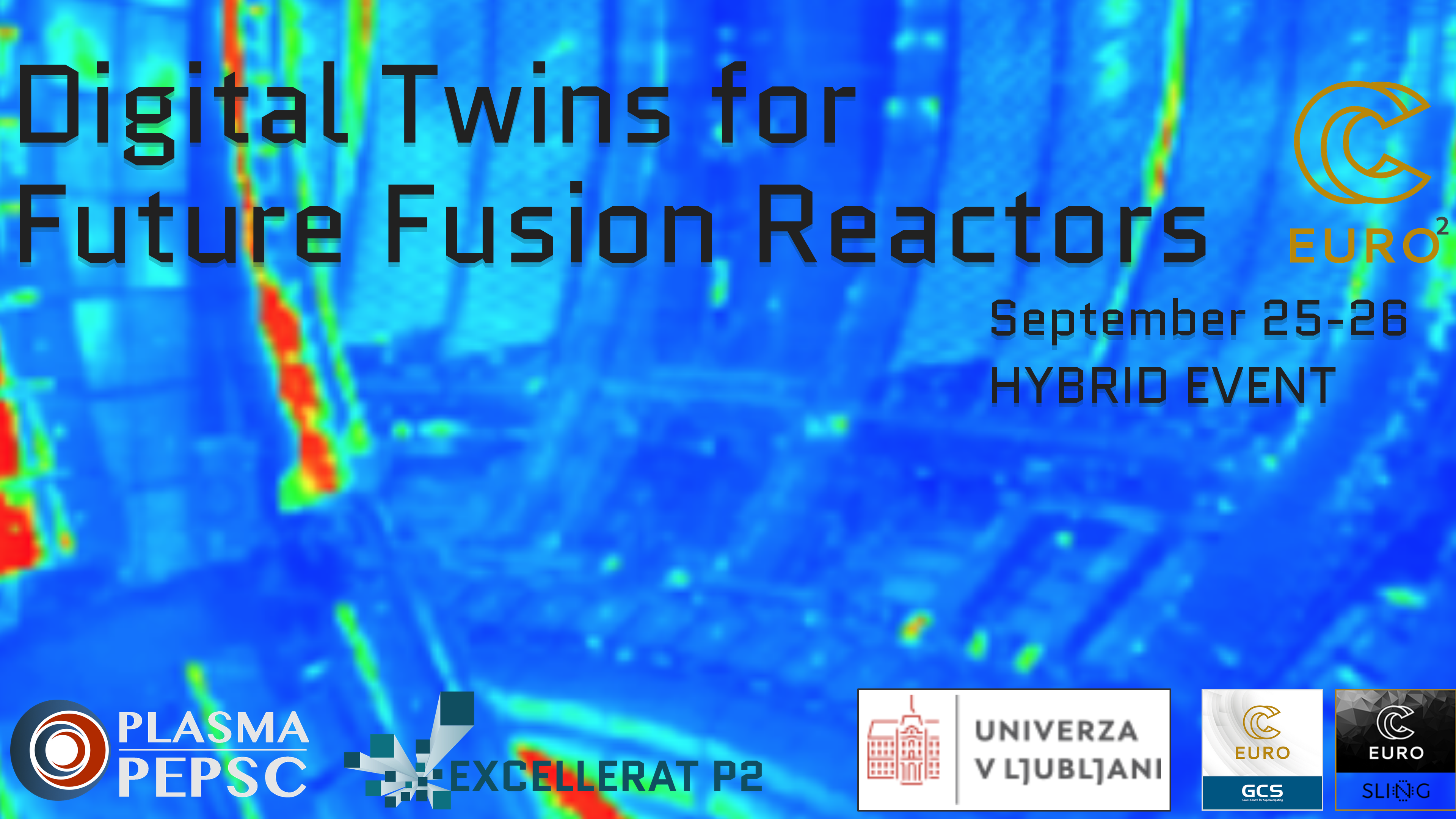
Description: Plasma-PEPSC and Excellerat P2 centers of excellence invite you to a detailed two-day training about simulations in the field of nuclear fusion reactors, digital twins and high performance computing. This event will connect experts and enthusiasts in research of advanced simulation techniques in the field of nuclear fusion, plasma physics and scientific use of supercomputing.
Join us at the detailed 2-day training in the use of advanced codes for nuclear fusion and digital twins of fusion devices, combined with the use of supercomputers. The event is organized by two Centers of Excellence – Plasma-PEPSC and Excellerat P2. The lecturers have experience in the development of plasma physics codes and optimization techniques to run the codes on HPC devices.
HPC simulations will play an important role in the future design of nuclear fusion reactors. Since the experiments are expensive, a lot of focus is directed to the development of high-performance codes in the field of nuclear fusion. HPC enables scientists to simulate extreme conditions in a fusion reactor in a precise manner, which is of great help in understanding the behavior of plasma in magnetically confined plasma devices. Programming codes used within Excellerat P2 and Plasma-PEPSC are used on HPC infrastructure to simulate plasma physics and response of diagnostic systems which measure different plasma properties, for example radiation distribution and temperature of first wall with IR camera. Accurate simulation can tell us what kind of signals to expect from the IR camera for specific plasma configurations. Key output is better understanding of plasma behavior to improve efficiency of magnetically confined fusion devices.
The role of Plasma-PEPSC is to develop plasma physics codes that deal with the behavior in the scrape-off layer region and to port the codes to HPC infrastructure towards peta- and exa-scale. The Excellerat P2 use case, dedicated to nuclear fusion, aims to develop ray tracing algorithms to simulate light propagation and prepare them for exa-scale simulation. At the workshop, users will prepare basic cases and learn how to use such codes on HPC infrastructure.
Detailed description:
- Participants will learn how to utilize EXCELLERAT P2 and Plasma-PEPSC codes, such as BIT1 for in situ analysis and streaming, to simulate diagnostic tools for measuring the light output of plasma. They will gain insights into accurately modeling plasma properties like temperature and density, enhancing the precision of fusion plasma measurements.
- The integration of ray-tracing techniques within EXCELLERAT P2 will be explored, demonstrating how to simulate light behavior in virtual environments. Participants will understand how ray-tracing generates images by tracing light paths and handling complex wall models with realistic materials, crucial for improving measurement accuracy in fusion reactors.
- Attendees will delve into the challenges of managing light reflections within reactors, which can interfere with plasma measurements, particularly in devices with metallic walls like JET and ITER. They will learn strategies to mitigate these interferences using advanced simulation tools.
- The event will cover how high-performance computing is applied in fusion energy research, particularly through the use of EXCELLERAT P2 and Plasma-PEPSC. Participants will be introduced to the role of exascale computing in addressing complex plasma simulations and data analytics challenges.
- Networking opportunities will be provided to foster connections among experts and enthusiasts in the fields of fusion energy, digital twins, and high-performance computing.
- Participants will acquire knowledge on scientific rendering techniques that aid in the visualization of complex simulations. They will learn how to create and interpret visual representations of plasma behaviors and diagnostics.
- The event will provide an overview of the roles and contributions of NCCs and CoEs in advancing high-performance computing and simulation technologies.
Difficulty: Intermediate, Advanced
Language: English
Prerequisite knowledge: Basic shell commands in Linux, parallelization techniques with OpenMP, OpenMPI, GPU parallelization, Numerical methods, Plasma physics simulation, Heat transfer simulation
Workflow: The training takes place live, in hybrid mode. Participants will get access to Vega HPC and they need to bring their own laptops.
Target audience: Fusion Energy Researchers: Scientists and engineers working in the field of fusion energy and interested in advanced simulation techniques and development of diagnostic tools.
High Performance Computing (HPC) experts: Professionals and researchers specializing in High Performance Computing (HPC) who want to learn more about its applications in fusion energy and digital twin research.
Simulation and modeling experts: Individuals involved in scientific rendering, ray tracing, and simulations of complex systems, particularly those related to plasma physics and energy systems.
Data scientists and analysts: Experts in data analytics and exa-scale computing interested in processing large-scale simulations and data from plasma experiments.
Academics and students: Professors, researchers, and graduate students in fields related to physics, computer science, and engineering who want to learn about the latest developments in fusion energy and high-performance computing.
Members of the National Competence Centers (NCC): Members and collaborators of the National Competence Centers for High Performance Computing who participate in the development of joint projects and wish to network with other NCCs and Centers of Excellence (CoE).
Skills to be gained:
- how to utilize EXCELLERAT P2 and Plasma-PEPSC codes.
- understand how ray-tracing generates images, crucial for improving measurement accuracy in fusion reactors.
- managing light reflections within reactors. Learn strategies to mitigate interferences using advanced simulation tools.
- high-performance computing in fusion energy research.
- role of exascale computing in addressing complex plasma simulations and data analytics challenges.
- scientific rendering techniques that aid in the visualization of complex simulations.
- create and interpret visual representations of plasma behaviors and diagnostics.
Location: University of Ljubljana, Faculty of Mechanical Engineering, Aškerčeva 6, 1000 Ljubljana
Virtual location:
Organizers:



Lecturers:
Ime: | Prof. Dr. David Tskhakaya |
Opis: | Plasma-PEPSC CoE |
E-naslov: | tskhakaya@ipp.cas.cz |
Ime: | Prof. Dr. Leon Kos |
Opis: | Plasma-PEPSC CoE |
E-naslov: | leon.kos@lecad.fs.uni-lj.si |
Ime: | Mr. Jeremy J. Williams |
Opis: | Plasma-PEPSC CoE |
E-naslov: | jjwil@kth.se |
Ime: | Mr. Matic Brank |
Opis: | EXCELLERAT-P2 CoE |
E-naslov: | matic.brank@fs.uni-lj.si |


 Twitter
Twitter

